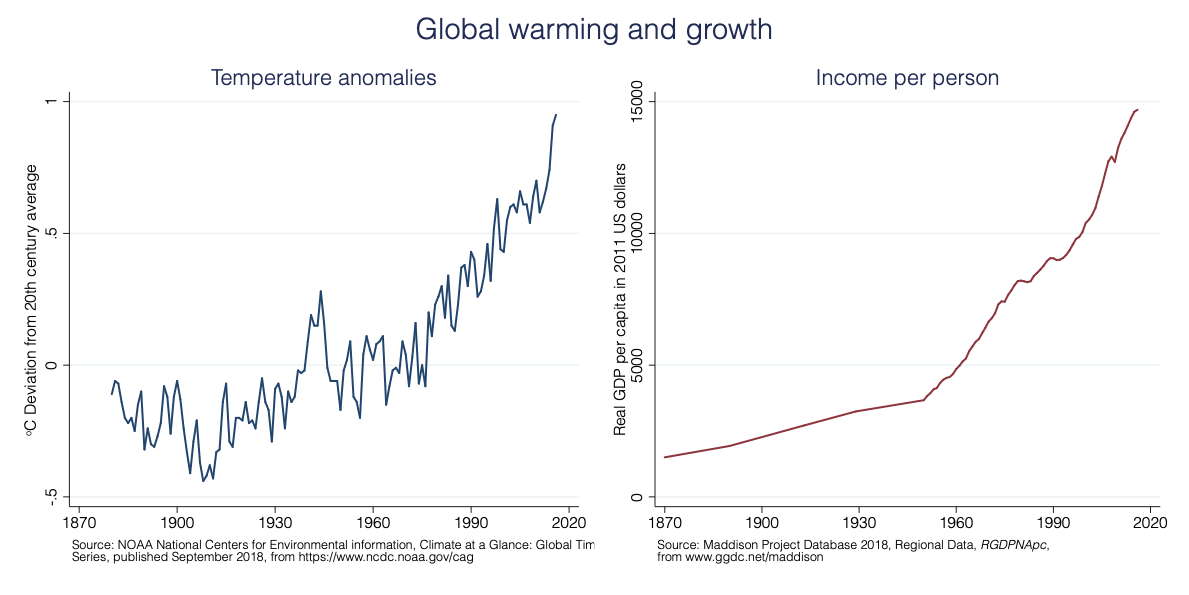The Nobel Prize stresses sustainable development

On October 8, the Nobel Prize in Economics was awarded to William Nordhaus and Paul Romer for their contributions to long-run economic development and the role of climate change (Nordhaus) and innovation (Romer). It is hard to overstate the importance of these themes.
Innovation, the development of new ideas and new products, is the main reason why global living standards have increased and extreme poverty has declined over the past 150 years. Yet the (so far) inescapable consequence of the increase in living standards is climate change: rising temperatures and sea levels and increases in extreme weather.
The following figure illustrates these twin trends, showing the trend in global warming on the left-hand side and the growth in income per person on the right-hand side. Compared to the average over the 1910–2000 period, the global temperature on land and ocean has already increased by 1°C and is on track to increase even more over the remainder of the 21st century. As the October 8 report by the Intergovernmental Panel on Climate Change discusses, a rise of more than 1.5°C would have severe adverse consequences around the world and keeping global warming limited to 1.5°C require rapid reductions in the emissions of greenhouse gasses.

The period since 1870 has also been characterised by rapid economic growth, with global average income person increasing nearly tenfold, from $1500 to $14700 in 2016. These figures are from the Maddison Project Database, based at Groningen Growth and Development Centre of the University of Groningen and which builds on the work of Angus Maddison.
The contribution of Paul Romer has been to improve our understanding of how innovation can be a continuing source of economic growth. Economists such as Robert Solow (the 1987 Nobel laureate) and Jan Tinbergen (1967) had shown that much of economic growth cannot be accounted for by the accumulation of human and physical capital – pointing to innovation as a crucial important driver of growth. Romer’s contribution was to incorporate innovation in models of economic growth. An important feature of such models is that, left to their own devices, markets fail to deliver enough innovation. This is because ideas can readily spread and be used by those who did not invest the money to develop them. An implication is that we need government policy, such as research funding and subsidies, to support the development and spread of new ideas.
The contribution of William Nordhaus has been to model the interplay between economic growth and the climate. In so-called Integrated Assessment Models, insights from physics, chemistry and economics are combined to understand how economic development will impact the climate and vice versa. These models have been an important tool in projecting how the climate will continue to change as economies develop and understand the economic consequences of climate change. Here too, a market failure takes centre stage: because firms and consumers do not bear the immediate costs of the pollution that is the results of their production and consumption choices, the free market leads to too much pollution. This, in turn, calls for government action and Nordhaus has been one the first to advocate carbon taxes to mitigate climate change.
In awarding the Prize to these eminent scholars, the Nobel Committee has underlined the importance of understanding long-run economic development and the importance of making this development sustainable over the long-run. At the University of Groningen, we work towards these same goals.
Further reading on the winners of the Sveriges Riksbank Prize in Economic Sciences in Memory of Alfred Nobel 2018.
About the author

https://www.rug.nl/staff/r.c.inklaar/

